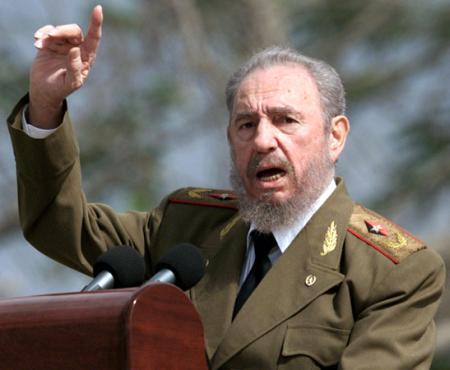
If Mr. F had not been slowly but surely morphing in his living flesh for the past five years, it could be argued that he is now going through another of his many deaths. The first, accompanied by a Proclamation signed by the pre-deceased himself, was the most shocking, because it had the effect of making public and palpable the mortal condition of the, up to then, undefeated commander. At that time, there was quite a stir not lacking in the most dissimilar feelings, from euphoria seasoned with drinking binges in wait for the anticipated celebration to some or other occasional sincere mourner, those always present in the human geography of this Island. Most people were saying “it was time, though I don’t like to wish anybody dead…” linked to the general belief we have been taught since childhood that to wish others dead means to precipitate our own death. There was not, thus, true interest in the salvation of the Messiah-come-lately, but the care to keep ourselves safe from bad omens. It is well known that in this country superstition has always exceeded worship.
Then, ever more sporadically, Mr. F has been shown to the media (or he has shown himself, we’ll never know) as proof that he is still alive. They have not been very convincing images, but we can see that, in fact, there was still a babbling old man with known features, though visibly deteriorated each time, now dressed in civilian clothes, in shirtsleeves or sports clothes, without the good looks of old, embarrassingly struggling in the mysterious webs of an accelerated decrepitude. Behind a broadcasted “improvement” in his convalescence, we common Cubans would be given only two signals as evidence of his life and questionable lucidity: “Reflections …” and the festive comments of that other lesser carnavalist, Hugo Chávez, the unofficial spokesman for [Cuban] Ground Zero.
Thus began F’s spiritual death before his physical one. His vibrant, fiery speeches, his impeccable uniform with its unique and un-reproducible epaulets, the eternally omnipresent, scraggly beard, his nails slightly projecting from their somewhat crooked fingers that clung tightly to the podium or menacingly shook to the whims of their unrepentant speaker have faded from people’s fancy. Unaware of it or not, Cubans continued to survive in their daily shakes, scratching the day every day, oblivious to their dithering failing genius. Nothing in our lives was significantly better or worse, and, in the presence of those scarce media presentations or other spectral and rare public appearances, a sense of morbid curiosity about the decline of the alpha senior predator, away from the fanfare he loved, has prevailed over a real interest in learning the word of the “leader of the people”. In fact, his words were becoming almost unintelligible, if not incoherent.
About a week ago, some media and informal groups circulated rumors about F’s supposed demise (“now final”). Others say he is in a coma, or is “very critical”, or that he has suffered a relapse (this time without the possibility of another “re-raise”), that he suffers from advanced Alzheimer’s, that he has had cardiorespiratory arrest events, that he recently suffered a stroke, etc., etc. They even say that “Yayabo” won’t come out again. The palace of the olive green caste has not confirmed nor denied these rumors.
Presumably, at this stage of the game and with the complicated picture of the nation’s reality in check mate, the complete disappearance of the patriarch might stir certain more-or-less hidden large interests, but for the average Cuban it won’t mean much. At least for the purposes of our little lives, in the short or medium term, nothing would move too much.
Perhaps the most convincing importance of what — nevertheless — will be a great event, after such a long wait, is that it would serve to finally illustrate, at the national level, once and for all, the supposed reformist vocation of the General-President, coauthor and heir of our national ruin. Because some intangible optimists (as a close friend of mine describes them) insist that F’s physical permanence in this world is the only obstacle to free his younger brother’s magical renewing measures and actions of that project they continue calling socialism; bold reforms that will in turn will save this unreality which they continue calling “revolution” despite its stagnation. There are stubborn believers who insist that F’s censure, and not the lack of political eagerness of the General, is actually responsible for the failure of the Sixth Congress of the CCP. Each defends his own illusions.
Let’s not forget that in this life, accounts are settled with those who are alive and not with the dead. This time, or some other time, one of F’s many deaths will turn out to be real and irrefutable. If we are finally on the eve of the biggest show of public mourning this Island has ever experienced, we will see what blame will be attributed then to the very likely failure of the vaunted National Conference next January. Perhaps the “political epitaph” genre will become the next bestseller in Cuban literature.
Translated by Norma Whiting
September 5 2011
